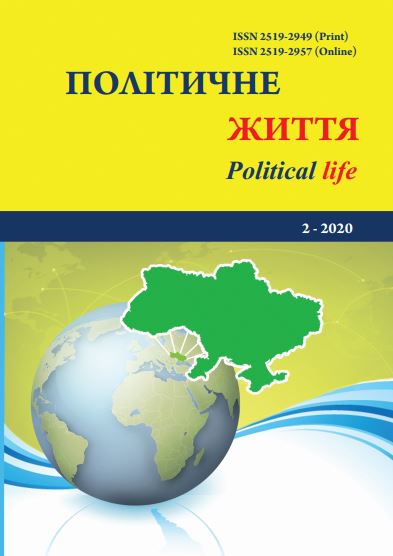Russian Federation‘s policy on Transnistrian conflict. Ukrainian survey.
DOI:
https://doi.org/10.31558/2519-2949.2020.2.17Keywords:
Transnistrian region of the Republic of Moldova, the Russian Federation, foreign policy, national security of UkraineAbstract
The article discloses the main foreign policy steps of the Russian Federation in relation to the Republic of Moldova and the Transnistrian region of the Republic of Moldova. The focus of the policy of the Russian Federation on this issue has a clear aim – to keep Moldova, with the help of all available political tools, in the sphere of its geopolitical influence. Russian authorities consider it necessary to keep the situation around Transnistria in a “frozen” state that ensures the control over the foreign policy of the Republic of Moldova and blocking of European and Euro-Atlantic sympathies and aspirations of the Republic of Moldova. The Russian Federation exercises such steps by providing its legitimate military presence in the region as a result of its participation in the peacekeeping operation Transnistrian region of the Republic of Moldova.
The author suggests us to consider steps of Russian foreign policy in relation to the Republic of Moldova and Transnistria, not in a historical context, but through the political, economic, and military aspects of such steps, dividing them into two major groups: The first of them is characterized by the creation and development of the conflict during the stage of armed confrontation with its subsequent maintenance in an active phase until the object of Russia's geopolitical pressure is losing its interests. The second is the completion of the stage of armed confrontation and the transfer of the conflict to the “frozen” stage because of the beginning of a long negotiation process with its subsequent maintenance in such a state for as long as possible.
Taking into account the equal value of the European and Euro-Atlantic choice of the Republic of Moldova and Ukraine, the existence of common border, there is a possibility that the Russian Federation will apply such political tools as were tested in the Transnistrian region of the Republic of Moldova with regard to Ukraine. Obviously there arises the necessity to prevent possible threats to the national security of Ukraine. Also there appears a necessity of preventing the development of the situation of Russian hybrid aggression of the Russian Federation against Ukraine by Ukrainian public authorities concerned.
The comparison of steps taken by the Russian Federation’s policy with respect to Ukraine from the outbreak of armed aggression and up to the present time with the Russian Federation’s policy regarding the Republic of Moldova and Transnistria makes it possible to determine at which stage of the Russian scenario is Ukraine and predict its development and thereby some countermeasures.References
Макаркин Алексей. План Ющенко и план Козака. URL: //www.rian.ru/analytics/20050615/40526451
(дата звернення: 22.01.2020).
Стенограмма ответов Министра иностранных дел России С.В. Лаврова на вопросы СМИ в ходе участия в 14-ом заседании СМИД ОБСЕ, Брюссель, 4 декабря 2006 года. URL: http://www.mid.ru/brp_4.nsf/sps /6BF4942CDFCA982AC325723A00526638 (дата звернення: 29.01.2020).
Меморандум об основах нормализации отношений между Республикой Молдова и Приднестровьем (подписан в г. Москва 08.05.1997). URL: http: //www.lawmix.ru/abro.php?id=6291. (дата звернення: 29.01.2020).
Socor Vladimir. Voronin pressured to accept settlement plan for Transnistria. URL: http://www.jamestown.org/edm/article.php?article_id=2372098%5C%22%22 (дата звернення: 30.01.2020).
Путін розповів про завдання Росії і найбільшу геополітичну катастрофу ХХ століття. URL: http://ua.korrespondent.net/world/256784-putin-rozpoviv-pro-zavdannya-rosiyi-inajbilshu-geopolitichnu-katastrofu-hh-stolittya (дата звернення: 12.02.2020).
Тодуа З.Д. Россия в Молдавии: вернуть инициативу. Россия в глобальной политике. Москва. 2007. № 1. С. 154–162.
О гражданстве Российской Федерации. Федеральній закон от 31.03.2002, № 62-ФЗ. URL: http:/consultant.ru/document/cons_doc_LAW (дата звернення: 24.05.2020).
Путін натякнув, що не проти приєднати Придністров’я. URL: http://espreso.tv/news/2014/04/17
/putin_natyaknuv_scho_ne_proty_pryyednuvaty_prydnistrovya (дата звернення: 30.01.2020).
Придністров'я проситься в Росію. URL: http://www.pravda.com.ua/news/2014/03/18/7019364/
(дата звернення: 25.03.2020).
Приднестровье обратилось к России за признанием. URL: http://tiras.ru/tema-dnja/40150-pridnestrove-obratiloskrossii-za-priznaniem-i-prisoedineniem-k-rossii.html (дата звернення: 25.04.2020).
Гамова Светлана. Кусок Молдавии уходит в собственность России. URL: http://www.ng.ru/cis
/2006-04-17/1_moldavia.html (дата звернення: 27.04.2020).
Нантой Оазу. Приднестровский конфликт и взаимоотношения Молдовы и Украины. Контекст. 2001. № 10. С. 22–34.
Перепелиця Г.М. Воєнна безпека України на межі тисячоліть. URL: http://www.niss.gov.ua/book /bezpeka/index.htm (дата звернення: 19.12.2019).
Не попадите в капкан, в котором барахтается Молдова. URL: http://google/arm/s/www.radiosvoboda.org (дата звернення: 25.05.2020).

